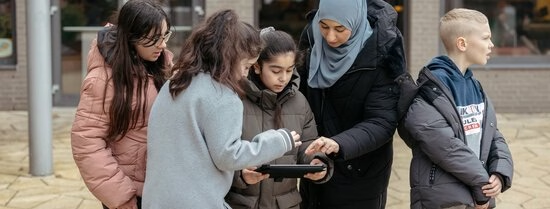The Academic Outreach Programme at Erasmus University Rotterdam (EUR) exemplifies how inclusive engagement can be executed structurally and strategically within the university's societal mission. The programme supports Rotterdam pupils, historically underrepresented in academic education, to explore and access academic pathways. In doing so, it operationalizes all five IDEA-L principles of inclusive engagement: Inclusive, Diverse, Equitable, Accessible, and Lasting.
Inclusive engagement
At the heart of the programme is a commitment to inclusive engagement. From its inception, it was co-created with pupils, caregivers, educators, school administrators, community organisations, and university students (i.e., student ambassadors) and staff to ensure that goals, priorities, and delivery formats of the programme not only reflect a shared mission but also respond directly to the systemic barriers that shape unequal access to academic education. Stakeholders are not merely consulted—they are actively invited to shape the programme's direction and delivery, recognising that those closest to the problem often hold the clearest insight into its solutions.
By valuing lived experience, cultural knowledge, and community insights alongside academic perspectives, the programme works to challenge dominant narratives about talent and merit. Role models (i.e., university students and staff) who share the backgrounds of pupils are involved throughout—from design to delivery—creating spaces where pupils can see their own identities reflected in academic contexts. This fosters recognition, belonging, and a more just sense of what is possible.
Diverse engagement
Diverse engagement is reflected in who is engaged and how. The programme team, including its student ambassadors and university staff, is intentionally diverse and share linguistic, cultural, and socioeconomic backgrounds with the pupils they engage with. This mirrors the lived realities of the communities the programme engages with and helps build trust and relatability. The programme also works with partners who bring different forms of diversity - grassroots initiatives, youth-led collectives, and schools - ensuring that outreach efforts are not just limited to formal institutions but also rooted in the lived experiences of underrepresented groups. Student-ambassadors are invited to take on leadership roles, shaping new programme directions and reflecting a commitment to representation and relevance.
Equitable engagement
To ensure equitable engagement, the programme recognises that unequal access to academic education is rooted in systemic barriers—ranging from socioeconomic disadvantage to institutional bias and lack of representation. It responds by designing outreach activities that are low-threshold, relationship-driven, and sustained over time, particularly in schools where academic aspiration is often undermined by structural disadvantage. Engagement takes place in familiar and trusted environments, such as local schools and community centres, as well as on university grounds to combat unfamiliarity with university spaces. Resources are dedicated to building trust and making space for pupils and caregivers to voice their needs and doubts.
The programme also compensates student ambassadors and community contributors fairly, acknowledging that equity requires redistributing not only opportunities but also recognition and resources. Planning processes account for this by embedding concrete measures—such as budget lines for community partner honoraria and logistical support for on-campus activities—into project proposals and institutional frameworks. These are treated as essential components of equitable engagement, not as optional extras. Importantly, collaboration partners are not required to pay for the outreach activities, removing financial barriers to participation and ensuring that collaboration partners serving under-resourced communities can still fully benefit from the programme.
Accessible engagement
Accessible engagement is central to how the programme communicates and operates. Written materials are prepared in plain, inclusive language, and key documents, such as invitations and consent forms are translated into multiple community languages, including Arabic, Dutch, English, French, Polish, Spanish, and Turkish. Where necessary, workshops and stakeholder engagement activities, are scheduled outside of standard working hours or offered online to accommodate caregivers. Sessions are adapted in length, tone, and delivery method to suit different groups. These might include shorter, interactive sessions for younger pupils or multilingual formats for families.
In addition to traditional communication tools, the programme also uses channels that may be more familiar or accessible to different communities, such as messaging apps or face-to-face contact, rather than relying solely on email or printed letters. This flexible approach to communication helps ensure messages reach their intended audience and supports stronger, more reciprocal relationships. Engagement methods are developed in dialogue with those who have lived experience of exclusion, such as first-generation university students and community workers, ensuring that accessibility is not a one-size-fits-all concept but tailored to real needs, preferences, and lived realities
Lasting engagement
Finally, the programme is designed with lasting engagement in mind. Rather than approaching outreach as a series of isolated initiatives, the programme is grounded in long-term relationships, shared goals, and mutual commitment. Strategic engagement with schools and communities is built over multiple years, fostering continuity and trust. Partners are actively involved in shaping activities and goals through regular joint reflection moments. This ensures that the programme remains responsive to changing needs and priorities.
Partners are engaged with transparency around goals and limiting factors, and reflective evaluation practices are built in throughout not only to measure outcomes, but to cultivate mutual learning. When financial or structural constraints limit the scope of programming, the emphasis remains on working together to explore alternative paths - without compromising on the commitment to shared goals and equitable effort. Success is not predefined unilaterally but co-defined with partners, allowing for shared accountability and continuous learning. Lessons learned, including challenges and failures, are documented and shared internally and externally to support a culture of transparency and long-term institutional learning.
In conclusion
The Academic Outreach Programme at EUR thus shows that inclusive engagement is not a checklist but a living practice. The IDEA-L principles are embedded in everyday decisions and long-term commitments, resulting in an approach to societal engagement that is relational, systemic, and transformative.
